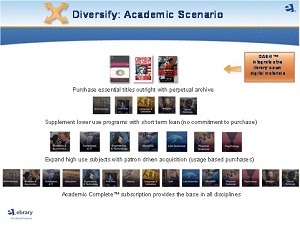Ebrary today announced a three-step approach to ebook acquisition for libraries. 
The steps involve libraries transitioning a greater percentage of their budgets from print to electronic, diversifying acquisition models, and streamlining order processes. Acquisition models include subscriptions, such as to the 71,500 volume Academic Complete or the 27,000+ Public Complete collection; patron-driven acquisition, in which titles are only purchased if used; short-term loans, and outright purchase through ebrary’s Perpetual Archive.
Short term loan and patron-driven options add an additional 120,000 titles; about 50,000 are available only through outright purchase. While the subscription packages are different and tailored to individual markets, for patron driven acquisition and perpetual archive all libraries—academic, public and school—can choose from the same selection of titles.
“Until now, all of the models have been somewhat competing. It’s a new way of thinking about acquisition. You need to combine models for the greatest ROI,” Marty Mullarkey, senior director of marketing at ebrary, told LJ.
However combining all the steps is only recommended, not mandatory. A library that is hesitant about patron driven acquisition, for example, could simply subscribe and purchase select titles outright.
The ebrary website offers slide presentations on how to apply the approach for public, academic, and school libraries, among others; these include details on how to simplify the ordering process.
The subscription pricing is based on FTE, ebrary told LJ. The others are at list price for single user, a percentage over list for multi-user access where available.
In addition, libraries can upload and integrate their own digital repositories with ebrary’s Dash (Data Sharing, Fast). Once uploaded, libraries can choose to make their DASH! collections open access, or restrict access within their institutions.
Carole Correa Morris, head of acquisitions at San Jose State University, has used all of the pieces of ebrary’s new model. In addition to the library’s subscription to Academic Complete, which Morris said, “provides a very large number of titles at a pretty low price,” Morris told LJ about the complementary nature of PDA and individual purchase. “The PDA that we have established so far was intended to be supplementary content. Our budget has been cut quite substantially and this provided another way to provide access to quite a lot of titles. After a certain amount of use inside the book we would buy it automatically. And it’s been a good thing. We haven’t seen anything that we would not want to have bought and many of them are seeing repeat usage. The fact that we’re paying money for something that’s actually getting use and not just buying it just in case is kind of nice.”
In contrast, the books the library buys right off the bat are the core content that PDA supplements. “There are things our subject selectors know. They’re going to be using it for a class; absolutely they want to have access to it.”


